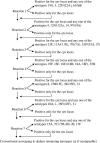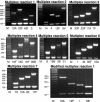Sequential multiplex PCR approach for determining capsular serotypes of Streptococcus pneumoniae isolates
- PMID: 16390959
- PMCID: PMC1351965
- DOI: 10.1128/JCM.44.1.124-131.2006
Sequential multiplex PCR approach for determining capsular serotypes of Streptococcus pneumoniae isolates
Abstract
Accurate serotyping is essential to monitor the changes in the seroepidemiology of Streptococcus pneumoniae. We devised a simple and schematic sequence-based system of seven multiplex PCRs, in a sequence order based upon Active Bacterial Core surveillance (ABCs) serotype distribution during 2002 to 2003, to reliably deduce specific pneumococcal serotypes. A total of 421 isolates from ABCs were randomly chosen to evaluate this system. Two hundred twenty-nine of the isolates (54.3%) were specifically assigned 1 of 17 serotypes by the multiplex PCR system, with the results in complete concordance with conventional serotyping. One hundred seventy-two additional isolates (40.9%) were assigned to 11 specific sets of 2 to 4 serotypes that with one exception (serotypes 6A and 6B) consisted of the single frequently occurring targeted serotype and 1 to 3 additional rare serotypes primarily within the same serogroup as the targeted serotype. Only 20 isolates (4.8%) could not be assigned specific serotypes or serotype sets, since they were either of rare serotypes not included in the assay design or were nonserotypeable. Overall, we found this system to be highly reliable, with the potential to greatly reduce our reliance upon conventional serotyping. Especially important is the capability of this system to give serotype-determining potential to any facility that lacks the expensive typing sera and expertise needed for conventional serotyping yet has the modest equipment necessary for DNA amplification and electrophoresis.
Figures


References
-
- Advisory Committee on Immunization practices. 1997. Prevention of pneumococcal disease: recommendations of the (ACIP). Morb. Mortal. Wkly. Rep. Recomm. Rep. 46:1-24. - PubMed
-
- Flannery, B., S. Schrag, N. M. Bennett, R. Lynfield, L. H. Harrison, A. Reingold, P. R. Cieslak, J. Hadler, M. M. Farley, R. R. Facklam, E. R. Zell, C. G. Whitney et al. 2004. Impact of childhood vaccination on racial disparities in invasive Streptococcus pneumoniae infections. JAMA 291:2197-2203. - PubMed
-
- Gertz, R. E., Jr., M. C. McEllistrem, D. J. Boxrud, Z. Li, V. Sakota, T. A. Thompson, R. R. Facklam, J. M. Besser, L. H. Harrison, C. G. Whitney, and B. Beall. 2003. Clonal distribution of invasive pneumococcal isolates from children and selected adults in the United States prior to 7-valent conjugate vaccine introduction. J. Clin. Microbiol. 41:4194-4216. - PMC - PubMed
Publication types
MeSH terms
LinkOut - more resources
Full Text Sources
Other Literature Sources
Medical

